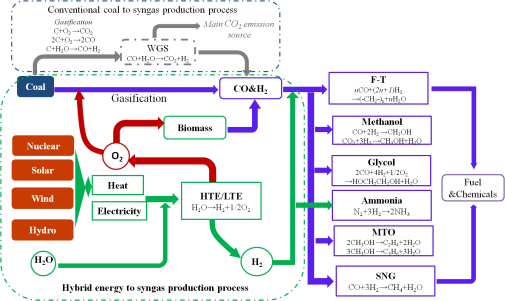Recently, a joint research team from CAS Key Laboratory of Low-Carbon Conversion Science & Engineering of Shanghai Advanced Research Institute (SARI) and SARI-ShanghaiTech University Joint Lab has proposed a hybrid energy system that integrates nuclear/ renewable energy with coal for a coal-based chemical industry. The latest result was published in the famous scientific journal Joule (http://www.cell.com/joule/fulltext/S2542-4351(18)30084-9) under Cell Press journals on March 14th 2018.
The coal to chemicals process by gasification is one of the major carbon conversion technologies, especially in coal- rich countries such as China and the United States. The conventional coal utilization pattern, however, causes a large amount of CO2 emission .
Nuclear/ renewable energy can supply heat and electricity for low/high temperature water electrolysis, then the hydrogen will be mixed with the syngas from the coal gasification unit to adjust the H/C ratio for downstream chemicals synthesis processes. In this case, the water- gas shift unit can be eliminated and then the system direct CO2emission can be significantly reduced. Thus, the hybrid energy system is proposed as a way to mitigate the carbon emission as an effective solution to integrate nuclear/ renewable energy with coal for low-carbon fuel and chemicals production.
The hybrid energy system is feasible in most coal- intensive countries and will lead to significant carbon emission reduction potential in the coming 5~15 years. Moreover, with the sharp decline of power cost from renewable/ nuclear energy and the carbon tax introduction, the hybrid system shows potential to become economically competitive. It is estimated that in 2030, the reduction capacity of CO2 emission from hybrid systems is equivalent to 90% of the Japanese CO2 emission (1,345 Mt) in 2014 and 33% of the European CO2 emission (3,696 Mt) in 2014.

Figure: the proposed hybrid energy system (image by SARI)
In the past few years, the CAS Key Laboratory of Low-Carbon Conversion Science & Engineering has made a series of achievements in the low carbon hybrid energy strategy area. Following the related research results published in Science China, Angew Chem Int Ed , Applied Energy, and Energy Conversion and Management, this work, supported by Chinese Academy of Sciences and SARI’s strategic partner Shell, is another achievement of research and education integration between SARI and ShanghaiTech University, which is also a landmark for the construction of Zhangjiang Comprehensive National Science Center.

